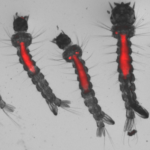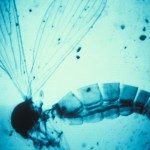Lien vers Pubmed [PMID] – 39623040
Lien DOI – 10.1038/s42003-024-07319-7
Commun Biol 2024 Dec; 7(1): 1603
Mosquitoes rely on their microbiota for B vitamin synthesis. We previously found that Aedes aegypti third-instar larvae cleared of their microbiota were impaired in their development, notably due to a lack of folic acid (vitamin B9). In this study, we found that diet supplementation using a cocktail of seven B vitamins did not improve mosquito developmental success, but rather had a significant impact on the sex-ratio of the resulting adults, with an enrichment of female mosquitoes emerging from B vitamin-treated larvae. A transcriptomic analysis of male and female larvae identified some sex-specific regulated genes upon vitamin treatment. When treating germ-free larvae with individual B vitamins, we detected a specific toxic effect related to biotin (vitamin B7) exposure at high concentrations. We then provided germ-free larvae with varying biotin doses and showed that males are sensitive to biotin toxicity at a lower concentration than females. Gnotobiotic larvae exposed to controlled low bacterial counts or with bacteria characterised by slower growth, show a male-enriched adult population, suggesting that males require less bacteria-derived nutrients than females. These findings indicate that during larval development, mosquitoes have sex-specific nutritional requirements and toxicity thresholds, which impact the sex ratio of adults.






